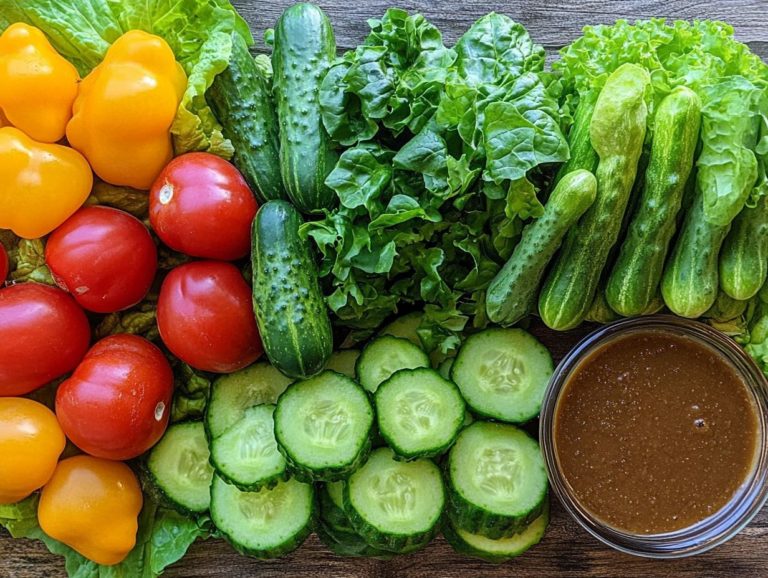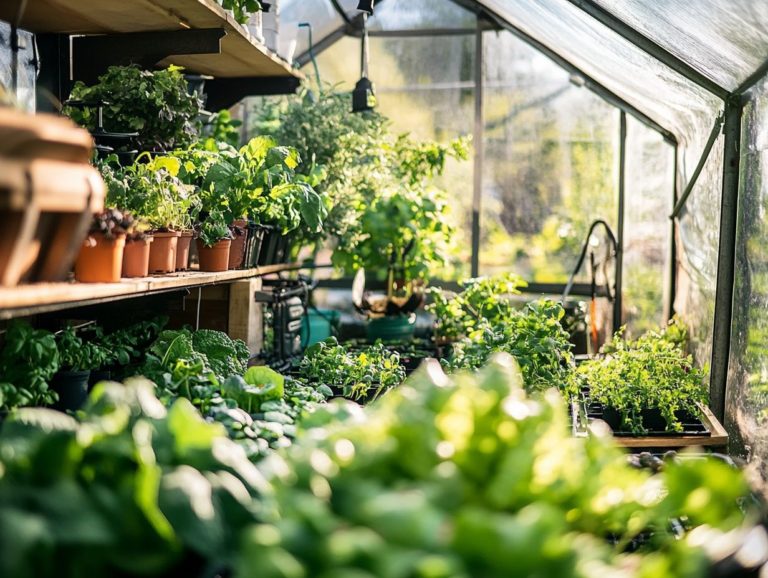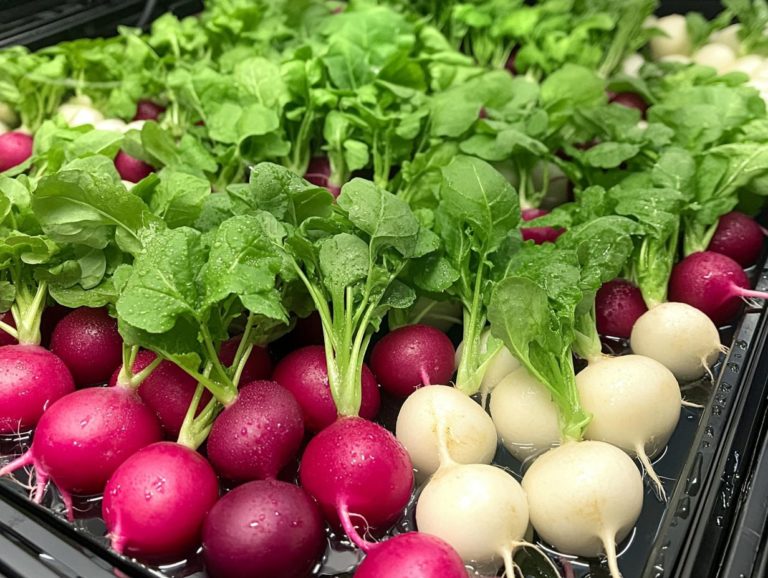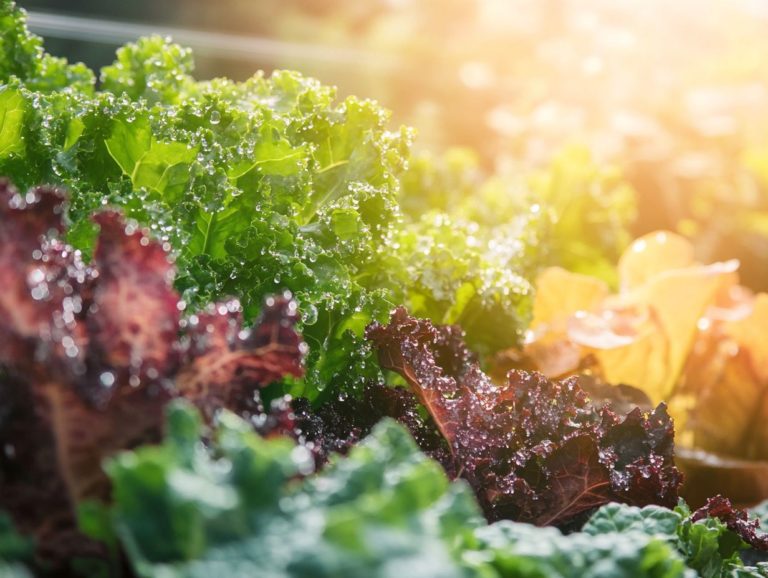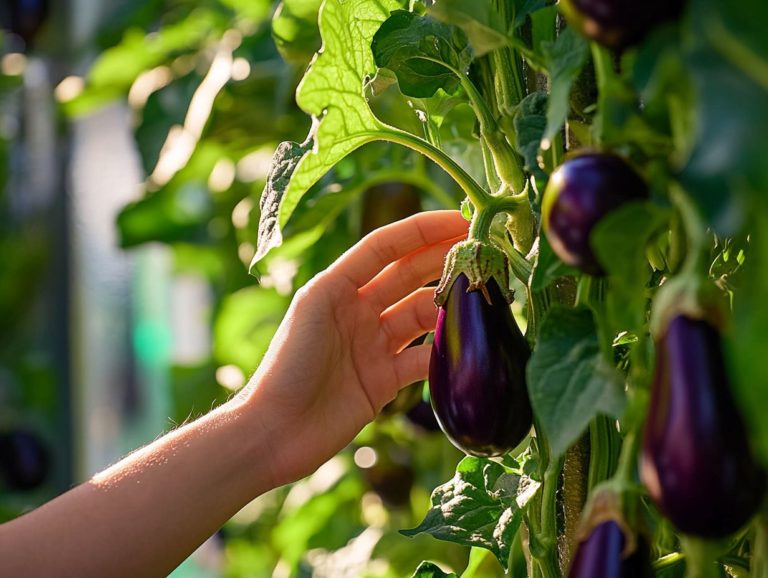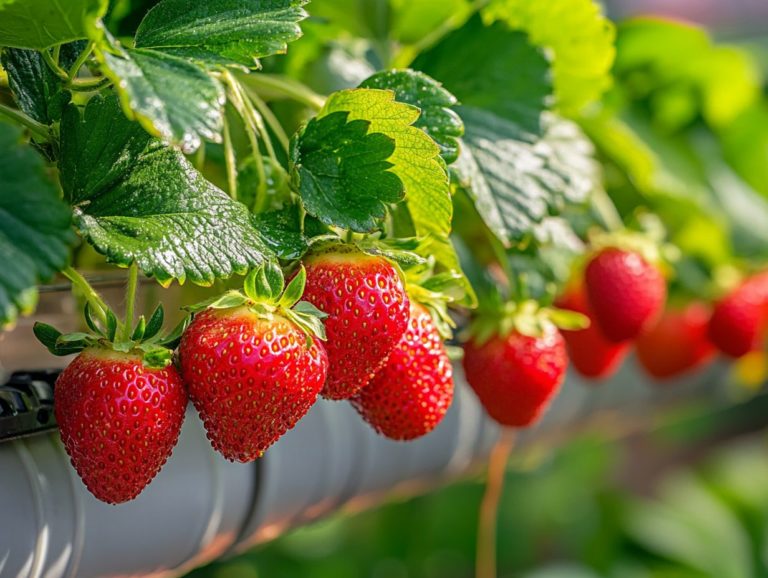“Exploring Hydroponic Varieties for Exotic Fruits”
Hydroponic gardening is revolutionizing the way you approach fruit cultivation, particularly when it comes to exotic varieties. Picture the delight of savoring fresh tropical fruits all year long, liberated from the limitations of seasonal farming.
This article will delve into the myriad benefits of growing exotic fruits hydroponically, showcase the types that flourish in these systems, and provide you with a comprehensive guide to setting up your own hydroponics setup.
You ll discover best practices and effective solutions to common challenges, equipping you for a successful venture into fruit farming.
Get ready to transform your gardening experience!
Contents
- Key Takeaways:
- Benefits of Growing Exotic Fruits Hydroponically
- Types of Exotic Fruits that Thrive in Hydroponic Systems
- Setting up a Hydroponic System for Exotic Fruits
- Best Practices for Growing Exotic Fruits Hydroponically
- Challenges and Solutions for Hydroponic Fruit Farming
- Frequently Asked Questions
- What is hydroponic farming?
- How is hydroponic farming beneficial for growing exotic fruits?
- What types of exotic fruits can be grown using hydroponics?
- How do hydroponic varieties of exotic fruits compare to traditional farming methods?
- What are some key considerations when exploring hydroponic varieties for exotic fruits?
- Can anyone engage in hydroponic farming for exotic fruits?
Key Takeaways:
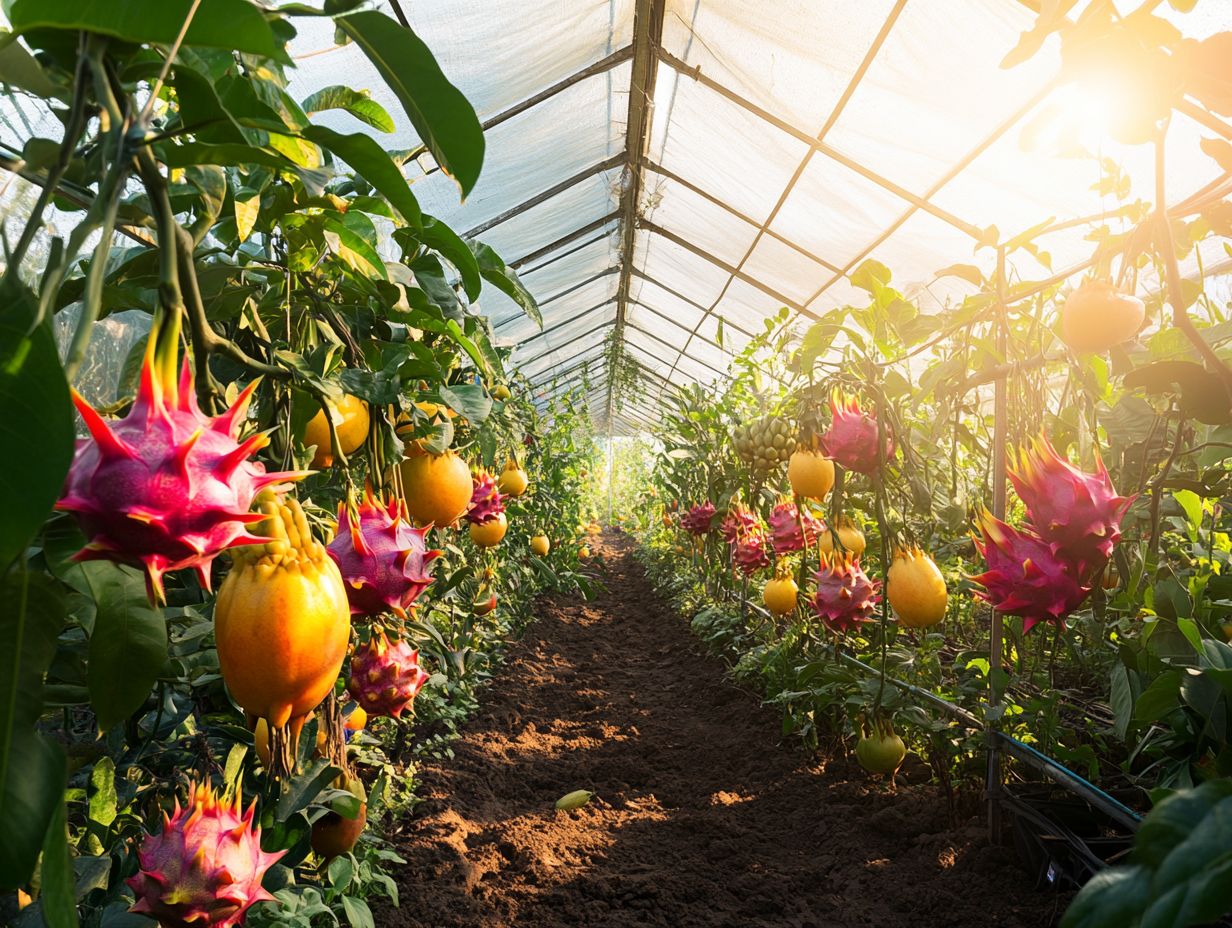
- Hydroponic systems allow for year-round availability and higher quality of exotic fruits, making them a great option for growers.
- Some exotic fruits that thrive in hydroponic systems include dragon fruit, pineapple, and passion fruit, each with unique characteristics.
- To successfully grow exotic fruits hydroponically, proper equipment, materials, and best practices, such as nutrient management and pest control, are crucial for optimizing plant nutrition and enhancing crop production.
What is Hydroponics?
Hydroponics allows you to grow plants without soil. Using nutrient-rich solutions, you can cultivate a variety of crops.
This includes leafy greens like lettuce and exotic plants in controlled environments. This remarkable system significantly reduces water usage and promotes faster growth and higher yields, especially in areas where traditional farming might struggle, making it ideal for urban gardening.
Rooted in ancient practices, hydroponics has gained traction as a solution to food scarcity and environmental challenges. The concept of soil-less cultivation has a fascinating history, dating back to the Hanging Gardens of Babylon. It has evolved into modern techniques like deep water culture and nutrient film technique, which delivers a thin film of nutrients over roots in a sloped trough.
These advanced methods boost growth rates and make urban gardening more accessible. Embracing sustainable farming practices has never been easier, enabling city dwellers to transform their surroundings. This approach reshapes urban landscapes and promotes food security while reducing the carbon footprint associated with transporting produce.
Benefits of Growing Exotic Fruits Hydroponically
Growing exotic fruits hydroponically offers a wealth of benefits that elevate your gardening experience. Imagine enjoying year-round availability of hydroponic produce, savoring enhanced quality, and cultivating crops like watermelons in urban areas where traditional farming might struggle to thrive.
With hydroponic systems, you can precisely control pH levels and tailor nutrient mixes to meet the specific needs of your plants. This ensures optimal plant growth. This level of customization boosts crop production and promotes sustainability, allowing you to cultivate a vibrant and fruitful garden in the heart of the city.
Year-Round Availability and Better Quality
Hydroponics opens the door to year-round access to exotic fruits. This allows you to provide consistent, high-quality produce that bursts with flavor and nutrients. A controlled environment optimizes plant nutrition, ensuring that you can cultivate fruits like cranberries, cantaloupe, and saffron alongside strawberries without being held back by seasonal constraints.
Hydroponics also eliminates challenges posed by weather and soil fertility. This creates a dependable food supply chain that meets the growing demand for fresh produce in urban areas. Unlike traditional farming, which grapples with issues like crop rotation and limited growing seasons, hydroponic systems enable you to harvest multiple times a year. You can boost the availability of coveted exotic fruits like blueberries while upholding strict quality standards.
With reduced pesticide use and enhanced nutrient delivery, you can offer consumers fresher, more flavorful options that are sustainably grown. This aligns perfectly with both health and environmental goals.
Types of Exotic Fruits that Thrive in Hydroponic Systems
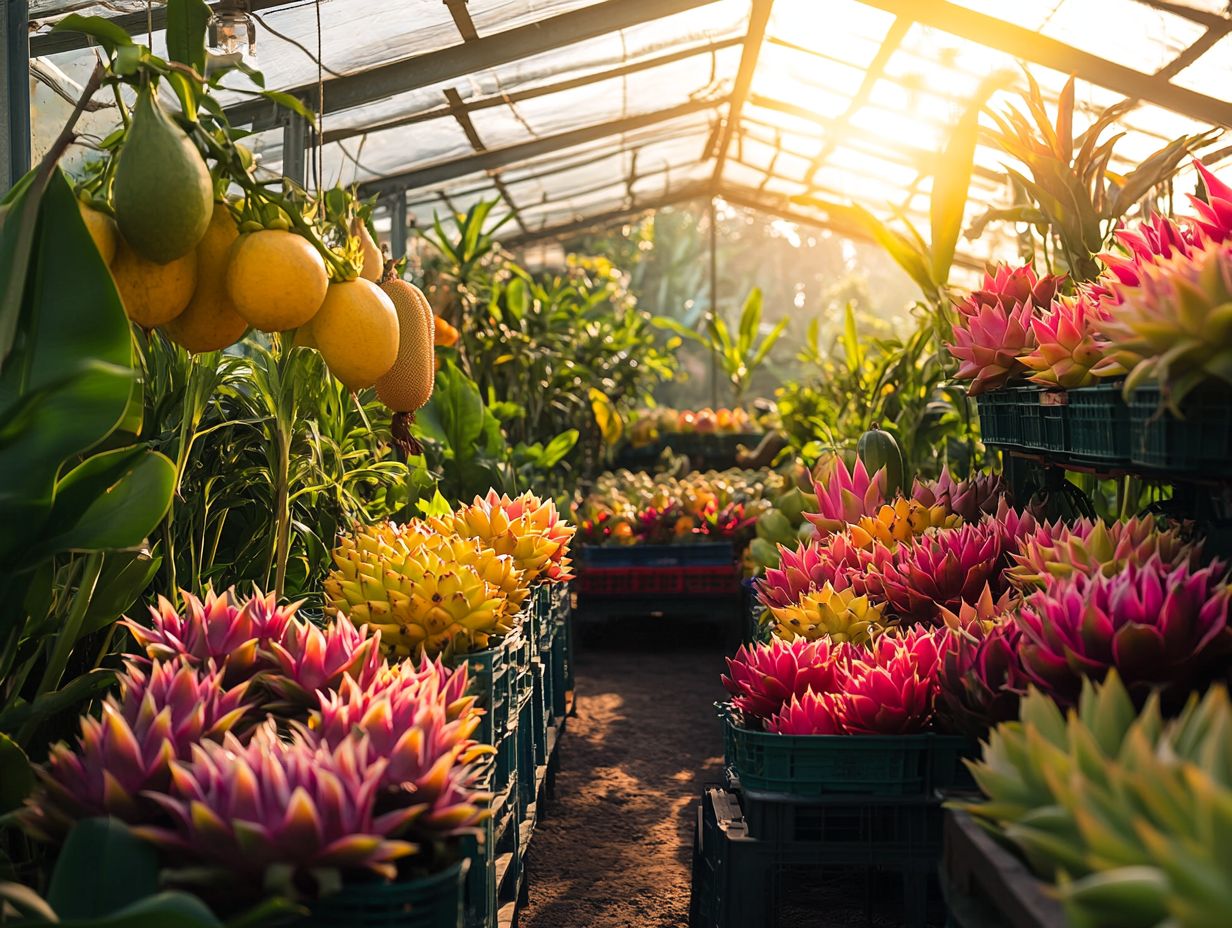
You ll find that a variety of exotic fruits flourish in hydroponic systems. From strawberries and blueberries to raspberries, watermelons, and even edible flowers, the options are truly diverse.
This versatility enhances your growing experience. It also allows for the seamless integration of microgreens, wasabi, and edible flowers, elevating your hydroponic garden with unique flavors and stunning aesthetics.
Examples and Characteristics
Hydroponic fruits, like strawberries, exemplify the potential of this innovative growing method. Known for their delightful sweetness, strawberries require precise pH levels the acidity or alkalinity level of the solution and nutrient mixes to truly thrive. This contributes to their status as popular hydroponic fruits. Similarly, blueberries flourish in acidic conditions, offering a bounty of rich antioxidants. Raspberries join the ranks as well, making them excellent choices for your urban gardening endeavors.
Hydroponic systems are also well-suited for growing tomatoes. They can yield significantly more than their soil-grown counterparts, especially when fed tailored nutrient solutions that align with their growth stages.
For instance, maintaining a pH level around 5.8 ensures optimal nutrient uptake for these plants, particularly for tomatoes and cucumbers. The beauty of hydroponics lies in its controlled environment. You can manipulate light and temperature to enhance fruit quality and marketability.
Strawberries can often produce up to 30% more fruit in hydroponic setups. This leads to higher profit margins, especially with the ever-increasing demand for organic produce. Embracing hydroponics could be a game-changer for your gardening success.
Setting up a Hydroponic System for Exotic Fruits
Establishing a hydroponic system for cultivating exotic fruits demands meticulous planning. You need to make discerning choices regarding equipment and materials, especially when considering methods like deep water culture or drip systems. This ensures that both plant nutrition and water usage are optimized, paving the way for successful crop production.
Choose from various hydroponic systems, such as deep water culture or aeroponics. Tailor your choice to the specific types of fruits you wish to grow and the unique conditions they require.
Start your hydroponic journey today and reap the benefits of fresh, exotic fruits year-round!
Equipment and Materials Needed
Get ready to embark on an exciting journey into hydroponics! To establish an effective hydroponics setup, including a hydroponic farm, you’ll need a range of essential equipment and materials. This includes nutrient solutions specifically designed for hydroponic farming and suitable growth media like rock wool.
It’s vital to have the right containers for your plants. You also need tools for monitoring acidity levels and environmental conditions to ensure the health of the exotic fruits and herbs you’re growing.
These components work in harmony to create a balanced ecosystem where your plants can thrive without soil. Key materials to consider include:
- Grow lights: These are engineered to deliver the perfect spectrum and intensity for optimal photosynthesis.
- Pumps: They circulate nutrient solutions directly to the roots, ensuring your plants get what they need.
- Air stones: These enhance oxygenation in the water, promoting robust root health.
- Nutrient measuring tools: These help you measure nutrients in the water to maintain the ideal balance of essential elements for your plants.
Monitoring factors like humidity and temperature is crucial for your hydroponics setup. These factors directly impact growth rates and overall plant health. For sourcing these items, garden supply stores or specialized online platforms can be fantastic resources, providing detailed descriptions to help guide your choices.
Best Practices for Growing Exotic Fruits Hydroponically
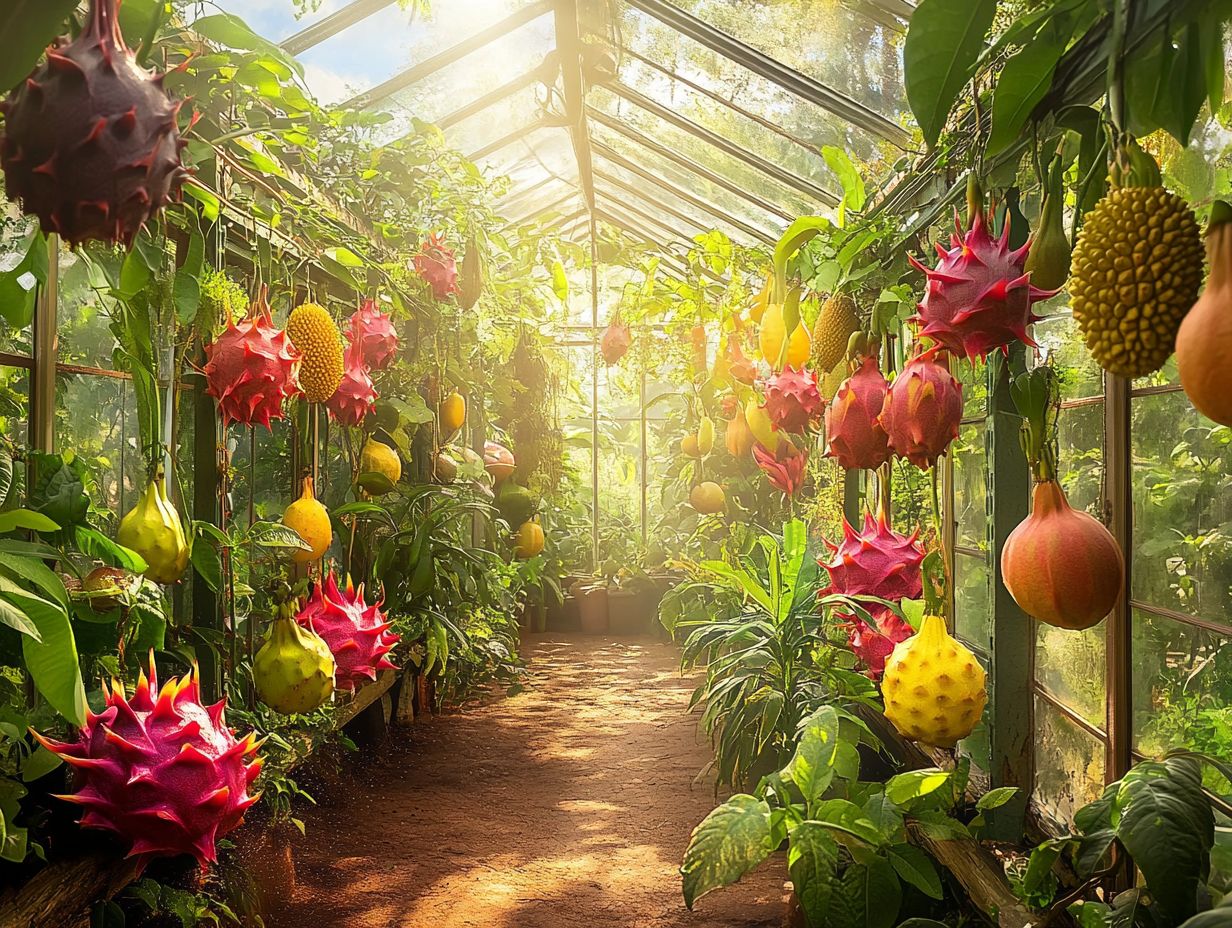
Implementing best practices for cultivating exotic fruits hydroponically is essential for attaining optimal growth and yield and ensuring the success of your urban agriculture initiatives. This approach allows you to fully harness the advantages of hydroponics in your crop production endeavors.
Focus on managing nutrients, monitoring acidity levels, and choosing the right crops, like basil and lettuce. These practices help your hydroponic setup thrive.
Tips for Optimal Growth and Yield
To achieve optimal growth and yield in your hydroponic systems, concentrate on several key factors: maintaining balanced nutrient solutions and meticulously monitoring environmental conditions.
Select crop varieties like carrots and beets that are specifically tailored for hydroponics. By implementing these strategies, you can truly maximize the benefits of hydroponics and elevate your overall crop production.
Using targeted nutrient mixes that correspond to the growth stage of your plants can greatly enhance their health and yield. Regularly testing the nutrient pH and electrical conductivity allows you to fine-tune these solutions for optimal absorption.
Controlling environmental factors like humidity, temperature, and light is crucial for plant health. This creates a stable growing climate that is vital for thriving plants and healthy herbs.
Incorporating practices like crop rotation and effective pest management techniques, including organic farming, ensures long-term sustainability while minimizing disease risks. These approaches align seamlessly with the efficiency of hydroponic systems and contribute to a more sustainable agricultural practice, ultimately resulting in higher quality produce.
Challenges and Solutions for Hydroponic Fruit Farming
Hydroponic fruit farming may present a range of challenges, such as nutrient management and nutrient solutions, disease control, and the need to maintain optimal environmental conditions for hydroponic systems. However, you can implement a variety of effective solutions to tackle these issues.
By embracing sustainable farming practices and harnessing advanced agricultural technology for sustainable farming, you can successfully navigate these challenges and cultivate a thriving hydroponic operation.
Embrace these strategies and watch your hydroponic garden flourish!
Common Issues and How to Overcome Them
Common issues in hydroponic systems, such as lack of essential nutrients, pH imbalances, and pest infestations, can pose challenges. However, you can manage them effectively with timely interventions and adjustments. Regularly monitoring your nutrient mixes and environmental factors like pH levels is crucial. This ensures optimal crop production and faster growth while preventing complications.
Take nutrient deficiencies, for instance. They often show up as yellowing leaves or stunted growth. By addressing these symptoms swiftly with balanced nutrient solutions, you can restore your plants to health in no time. pH imbalances, on the other hand, can hinder nutrient absorption. Using pH testers frequently allows you to make necessary adjustments promptly, keeping your plants thriving.
Pest infestations can often be hidden but can be managed by using integrated pest management techniques. These include introducing beneficial insects or applying organic treatments for pest control. By staying vigilant and responsive, you can cultivate a healthy environment for growing herbs and leafy greens, nurturing thriving plants and ensuring ample yields of hydroponic produce.
Frequently Asked Questions
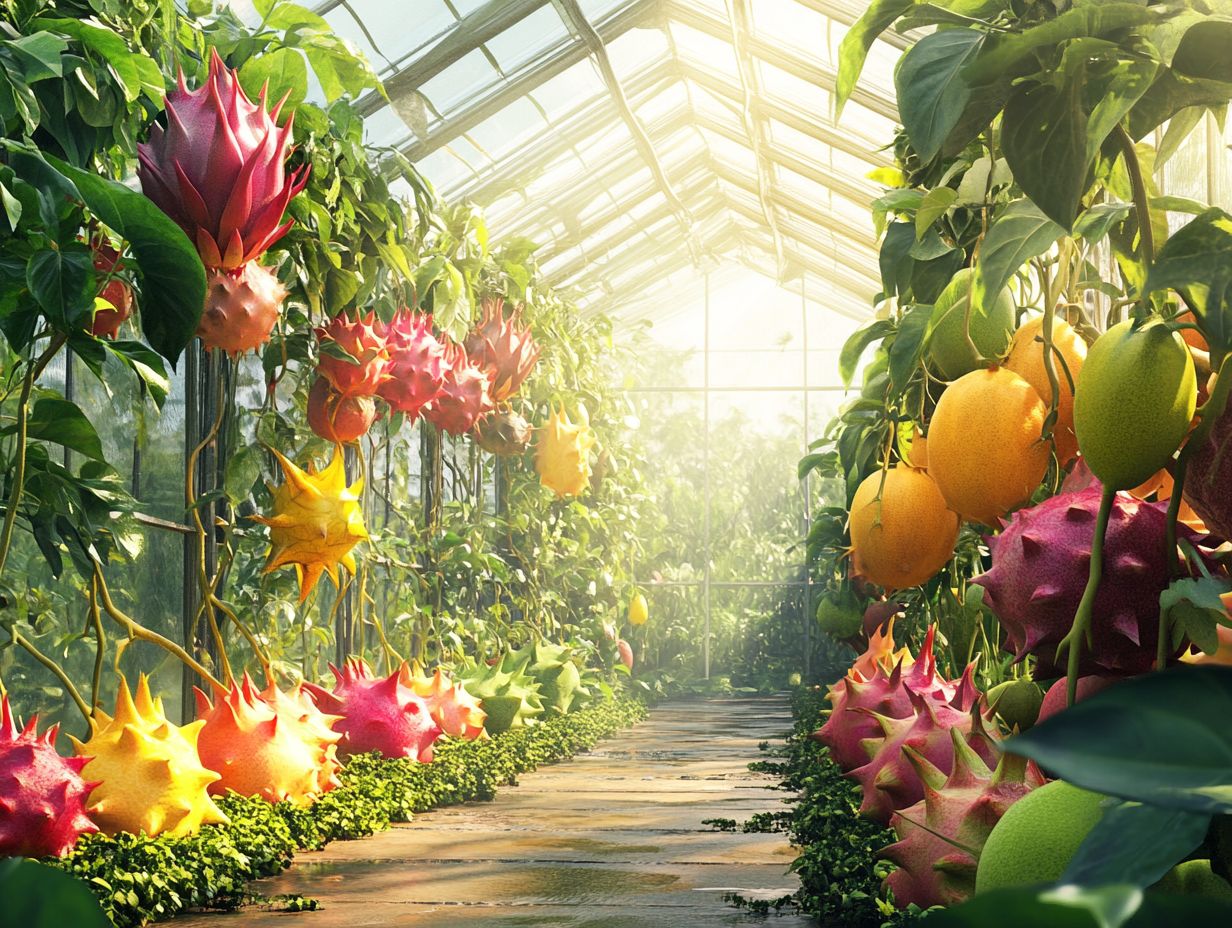
What is hydroponic farming?
Hydroponic farming is a method of growing plants without soil, using only water and essential nutrients. It involves a controlled environment and specialized equipment to provide optimal conditions for plant growth.
How is hydroponic farming beneficial for growing exotic fruits?
Hydroponic farming gives you unparalleled control to grow your favorite exotic fruits! This method ensures that exotic fruits receive the necessary nutrients and conditions for optimal growth, and it eliminates the need for soil, making it easier to cultivate fruits that may not thrive in certain regions.
What types of exotic fruits can be grown using hydroponics?
There are several exotic fruits that can be successfully grown using hydroponic farming. Common examples include dragon fruit, passion fruit, papaya, and pineapple. However, the possibilities are endless and depend on specific conditions and techniques used.
How do hydroponic varieties of exotic fruits compare to traditional farming methods?
Many growers find that hydroponic varieties of exotic fruits often have higher yields. The controlled environment allows for optimal growth conditions. These fruits also tend to have a longer shelf life and may be free of pesticides compared to those cultivated using traditional farming methods. However, traditional methods may still offer a wider variety of fruits.
What are some key considerations when exploring hydroponic varieties for exotic fruits?
When exploring hydroponic varieties, some key considerations include climate, resource availability, and equipment maintenance costs. It’s important to research the specific requirements of the exotic fruits you want to grow, as well as potential challenges that may arise.
Can anyone engage in hydroponic farming for exotic fruits?
While hydroponic farming can be a more accessible method of growing exotic fruits, it still requires knowledge, skill, and resources. It s recommended to do thorough research and consult with experts before starting a hydroponic farm for exotic fruits.
Ready to start your hydroponic adventure? Dive in today!

